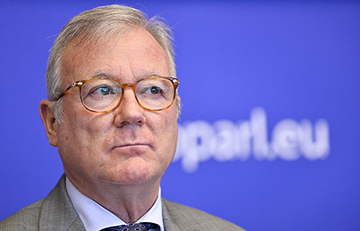European Parliament Vice-President: We Must Protect Freedom Of Speech In Belarus
3- 7.03.2018, 9:59
- 25,202

The vice-president of the European Parliament from Spain Ramon Luis Valcarcel has sent official inquiries to the European Commission in connection with the blocking of the Charter97.org website in Belarus.
One letter was sent to European Commissioner for Enlargement and European Neighborhood Policy Johannes Hahn, a second letter of the same content – to European Union's High Representative for Foreign Affairs and Security Policy Federica Mogherini.
Ramon Luis Valcarcel's letter stresses the importance of press freedom in Belarus as a necessary condition for the emergence of a free democratic Belarus. In addition, it explains the importance of Charter-97 for protecting regional security from the influence of the Kremlin’s propaganda.
The Vice-President of the European Parliament asks whether the European Commission intends to take action in connection with the blocking of Charter 97 and asks for information about these measures. The letter ends with the words: "If we do not defend press freedom today, a time may come when there will be no other freedom left to defend in Belarus."
Here is the text of the European Parliament Vice-President’s letter to Federica Mogherini and Johannes Hahn:
Allow me to address you with regard to the difficult situation facing press freedom in Belarus. The country's leading independent news website, Charter97, was blocked on January 24. The Ministry of Information accused it of publishing reports "liable to harm Belarus's national interest", but did not cite any specific content. Reporters without Borders and other organizations have condemned the ban.
Known for its commitment to the promotion of democracy and human rights, Charter97 had become the bulwark of press freedom in Belarus. Hence, this is not the first obstacle that the outlet has encountered throughout its existence. Take as an example that Editor-in-chief Natalya Radina (who received the international Press Freedom Award in 2011) lives in exile after being held by the KGB.
However, this new act of censorship is not understandable in the current context of relations, since it contradicts Minsk's attitude towards the EU. Furthermore, the ban raises concerns on the overall security situation in the region, since most Charter97 readers have started to get their news just through other media, the majority of which is under either state or Kremlin control. In the medium to long term, this tendency could erode even more the social base that defends freedom in Belarus.
Wide aware of the difficulties facing civil society in Belarus, the European Union has opted for a renewed approach that puts people at the heart of its policy towards the country, for instance by fostering training and mobility programs. This renewed approach, together with 2016 lifting of sanctions, makes it even more important for us to continue demonstrating a firm, constant and unwavering support to the Belarusian citizens that are committed to defending human rights and democratizing their country. This necessarily entails supporting press freedom without reservation.
Just as the European Union cannot abandon the hopes of so many Belarusians that believe in a democratic and freer Belarus, we can not turn a blind eye to this new act of censorship. Hence, while I understand that the Commission has to act with the prudence that the fragility of the relations between the EU, Belarus and especially Russia requires, I would kindly like you ask whether the Commission intends to take any action on this matter. I remain at your full disposal and I am looking forward to receiving any information on the situation that you may consider relevant.
I am convinced that if we do not defend press freedom today, a time may come when there will be no other freedom left to defend in Belarus.










